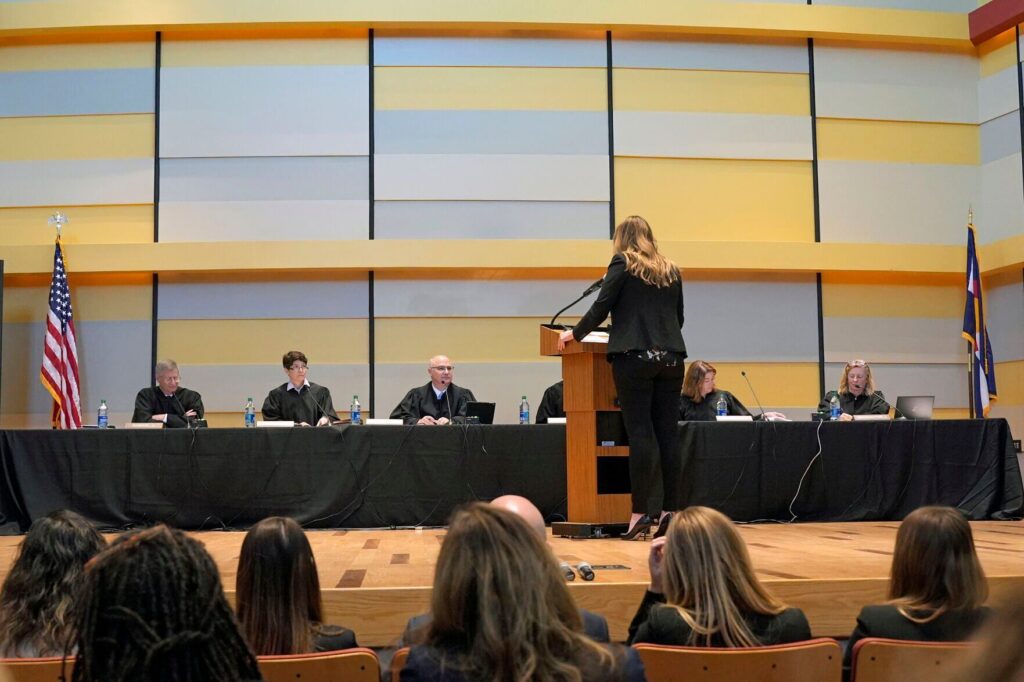Judge tosses El Paso County Republicans’ lawsuit against state GOP over who can run party’s election

A district court judge on Thursday threw out a complaint filed by the El Paso County Republican Party that sought to prevent the Colorado GOP from stepping in to run the county party’s upcoming leadership elections.
Colorado law clearly gives state political parties’ central committees the power to resolve county party controversies, leaving the courts without jurisdiction in such disputes, 18th Judicial District Judge Elizabeth Volz said in an order dismissing the county GOP’s lawsuit.
A complaint filed last week by El Paso County GOP chair Vickie Tonkins and six precinct-level Republican officers on behalf of the county party asked the court to block the state Republican Party and its chair, Kristi Burton Brown, from putting in place a neutral team of outsiders to supervise the county party’s reorganization meeting, which is scheduled to take place on Saturday in Colorado Springs.
An attorney for Tonkins and the El Paso County party said late Thursday that his clients are “disappointed” with the ruling and plan to appeal.
That means county Republicans still plan to hold two separate party elections on Saturday at different locations, with each side charging the other’s is illegal and won’t count.
At the meetings, part of the biennial reorganization Colorado’s major political parties are undergoing this month and next, local Republican are supposed to elect a chair, vice chair and secretary to two-year terms.
Burton Brown cheered the judge’s ruling in a statement to Colorado Politics.
“I appreciate the Court agreeing with long-standing Colorado law that allows the Republican Party to govern ourselves,” she said in a text message. “This is a victory for the rule of law, the First Amendment, and Republicans across the state who want fair, safe, and legal meetings.”
Last week, the state GOP’s central committee voted to strip Tonkins of any authority to run the leadership election and instead designated Gregory Carlson, the former Republican chairman of neighboring Fremont County, to be in charge. The meeting will also see the election of dozens of so-called bonus members from the county, apportioned based on votes received by top-ticket Republicans in the last election.
That vote followed sometimes bitter debate between supporters of Tonkins, who charged the state can’t do what it proposed under Colorado law, and her detractors, who argued that Tonkins has repeatedly favored some Republicans over others, including when she formally condemned a Republican group that set up their own voter contact organization just days before the November election.
In an email to county Republicans, Burton Brown spelled out the consequences of Thursday’s court decision.
“If you are a member of the El Paso County Central Committee, your vote will ONLY BE VALID if you cast it at the Discovery meeting,” Burton Brown wrote. “Please attend and vote at that meeting. The meeting Chairwoman Tonkins is leading is not the officially recognized meeting, and anyone who claims to be elected out of that meeting will not be recognized.”
Earlier on Thursday, Tonkins sent the latest in a string of emails to fellow Republicans staking out a contrary position.
“Below is the only official call and information regarding the only legitimate meeting,” Tonkins wrote, adding that her attorneys had filed for a temporary restraining order “against the corrupt establishment insiders who are trying to mislead you and steal your vote so there is no reason to go to the fake meeting.”
Tonkins, who is seeking a third two-year term running the local party, earlier asked for court orders to prevent the state GOP from overseeing the county election, but the decision issued on Thursday by the district court judge made those requests moot.
The spectacle of dueling county party elections is the latest eruption in a years-long dispute between factions of the local party – on one side, veteran GOP organizers and multiple current and former elected officials, with Tonkins and her supporters on the other.
At stake is who gets to control the Republican organization in the state’s most populous county, which has long been considered the GOP’s heavyweight in Colorado.
Colorado’s two major political parties kicked off their biennial reorganization process several days ago, with county parties set to hold officer and bonus member elections in the next two weeks. Republicans and Democrats plan meet in mid-March and early April, respectively, to elect statewide party leadership.
Tonkins’ critics charge that she has demonstrated bias against some Republicans and can’t be trusted to run the reorganization meeting fairly, while she counters that her opponents are merely trying to regain control of the party after being pushed aside in recent years by a wave of newly energized Republicans – many inspired by former President Donald Trump and his MAGA movement.
In her ruling, Volz cited two Colorado court decisions – one in Denver District Court in 1903 and another ruling by the Colorado Court of Appeals in 1981 – to support her finding that courts don’t have jurisdiction to sort out who should chair county poltiical parties’ organization meetings.
“What each of these cases demonstrates is that the state committee of a political party has the authority and jurisdiction to determine how it shall function,” Volz wrote, adding, “Plaintiff/Petitioner is asking this court to direct the state committee on its ability to make such determinations. This Court does not have jurisdiction over such matters.”
Brad Bergford, one of the attorneys representing Tonkins and the local Republican Party, said in an email to Colorado Politics that Burton Brown had drawn inaccurate conclusions from the judge’s ruling.
Referring to the order, Bergford said it is important to note what the judge hadn’t said.
“Thus, the Court did not say that the State Central Committee is the ‘final authority,'” Bergford said. “It just said that it cannot weigh this controversy.”
Additionally, Bergford argued that “the Court did not dismiss Plaintiffs’ claims. What the Court did was dismiss the lawsuit for lack of jurisdiction. There is an important difference between these two.”
He said the court “did not pass upon the various claims as Brown’s email suggests. The essence of the Court’s ruling is that it cannot rule upon Plaintiffs’ claims in the first place.”
Burton Brown shrugged off word that Tonkins and her fellow plaintiffs intend to appeal the ruling.
“Of course they will,” she said in a text message. “But it’s going to be moot.”













